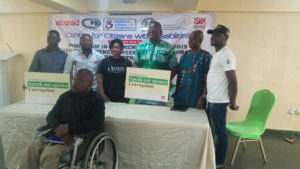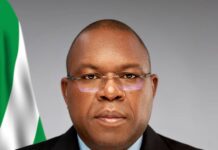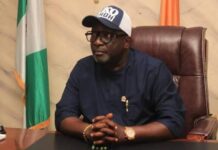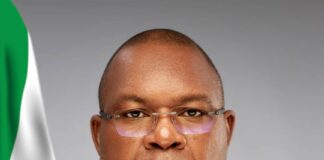By Abasifreke Effiong
AKWA IBOM- Persons living with disabilities in Akwa Ibom state have called on Governor Udom Emmanuel to reconsider the Physically Challenged Persons Protection Bill passed by the state house of assembly and sign it into law.
Different clusters of PWDs in the state speaking at a two day symposium to mark the 2019 disability awareness week/ international day for persons with disability in Uyo, decried the non-inclusion of disabled persons in the government of the state.
They said the non-inclusion of the disabled persons by the government and the treatment of disability issues as charity was making their situation more pitiable.
 Resource persons with members of staff of Centre for Citizens with Disabilities at the symposium
Resource persons with members of staff of Centre for Citizens with Disabilities at the symposium
The Akwa Ibom State House of Assembly passed the Physically Challenged Persons Protection Bill in November 2016, but the governor, Mr. Udom Emmanuel, has withheld assent to the Bill since then.
The Attorney General of the state and Commissioner for Justice, Barr. Uwemedimo Nwoko said recently on a radio programme broadcast in the state that he advised the governor not to sign the Bill to avoid litigations.
The two day symposium on the theme, “The way forward: Nigeria disability Act as a panacea to corruption”, was organised by Centre for Citizens with Disabilities (CCD).
CCD is a not-for-profit organisation that works Department for International Development (DFID), Justice for All Programme- DFID, Open Society Initiative for West Africa (OSIWA), Ford Foundation, Population Council, National Democratic Institute (NDI), US Consulate, The Netherland Embassy, Chevron, and other organisations to promote independent living, human rights and social inclusion of persons with disabilities.
Speaking, the Executive Director of CCD, Mr. David Anyaele said the symposium which took place in six states focuses on the empowerment of persons with disabilities for inclusive, equitable and sustainable development as envisaged in the 2030 agenda for sustainable development.
Anyaele who was represented by Mrs. Peace Ezekiel said that SDGs will not be achieved if states and none state actors continue to discriminate, isolate and marginalize the over 25 million Nigerians living with disabilities in the planning and implementation of the SDGs.
He decried the impact of corruption on PWDs and also expressed concern over the non-inclusion of PWDs in the fight against corruption.
“We are concerned that anti-Corruption agencies in Nigeria do not include organisations of persons with disabilities in the fight against corruption even though persons with disabilities the scare of the negative impact of corruption. We urge anti-corruption agencies to take appropriate measure to involve and construct their anti-corruption fights using disability eye lens as persons with disabilities carries the greatest burden of corruption in our society.”
Anyaele also decried the non-adoption of the Discrimination Against Persons with Disabilities (Prohibition) Act 2018 by the state, appealed to Akwa Ibom state government to adopt the law.
Ten states, namely Kano, Jigawa, Anambra, Kogi, Ondo, Lagos, Ekiti, Plateau, Kwara and Bauchi have so far adopted the law.
The lead presenter at the symposium, Mr. Tunde Salman, convener, good governance team, said states that do not adopt the Discrimination Against Persons with Disabilities (Prohibition) Act were discriminating against PWDs.
Salman encouraged PWDs in Akwa Ibom state to take part in arousing citizens’ sentiments against corruption, noting that when an act of corruption is covered up, the impact of that corrupt act is four times higher on PWDs than other persons.
Some of the discussants at the two day event included, Executive Director of Policy Alert, Mr. Tijah Bolton-Akpan; Chairman, Civil Society Organisations Forum in Akwa Ibom state, Mr. Harry Udoh; Executive Director, Youth for Change Initiative, Mr. Emem Edem; Barr. Saviour Akpan, Executive Director, Comppart Foundation.
Goodwill messages were received presented by the ICPC, and the Commissioner for Science and Technology, Dr. Iniobong Essien.
















